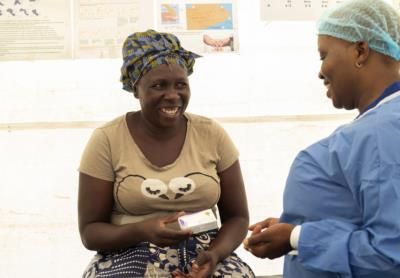Urgent Need for Family Planning Services in Epworth, Zimbabwe
41-year-old Catherine Tavaruva receives contraceptive pills at an outreach clinic in Epworth, Zimbabwe, Thursday, Nov. 14, 2024. (AP Photo/Aaron Ufumeli)
In the heart of Epworth, Zimbabwe, an essential outreach clinic is making a significant impact by providing comprehensive family planning services to women like Sithulisiwe Moyo. Many women are determined to avoid unplanned pregnancies that could hinder their educational aspirations. However, the survival of these critical services is at risk due to the anticipated reinstatement of the global gag rule by the incoming U.S. administration.
The Global Gag Rule: A Historic Policy with Serious Implications
The global gag rule, a contentious policy over the last forty years, prohibits U.S. foreign aid from funding any activities related to abortion, directly or indirectly. This regulation has typically been reinstated by Republican presidents and lifted by their Democratic counterparts, leading to significant ramifications on women’s health services across the globe.
During Donald Trump’s previous presidency, the expanded global gag rule led to a considerable reduction in funding for non-governmental organizations (NGOs) that provided essential health services. The fallout was particularly acute in African countries like Zimbabwe, where organizations such as Population Services Zimbabwe experienced severe financial setbacks, resulting in the curtailment of critical services.


History and consequences of the global gag rule on women’s health services.
The Ongoing Struggles of Women and NGOs
Advocates for women’s health are deeply concerned about the potential reinstatement of the gag rule. They warn that it could lead to a troubling resurgence of unintended pregnancies, unsafe abortions, and an increase in maternal mortality rates. The potential impact is staggering; estimates suggest that millions of women may lose access to vital healthcare services if funding is further curtailed.
Organizations such as MSI Reproductive Choices are actively lobbying for abortion rights and exploring alternative funding avenues. However, the heavy dependence on U.S. aid complicates matters for NGOs trying to navigate the intricate landscape of reproductive healthcare. Some organizations may feel pressured to change their guidelines or downplay discussions on abortion just to secure necessary funding, resulting in difficult moral choices and compromises.


Impact of global gag rule on family planning services in Epworth, Zimbabwe.
The Critical Need for Continued Support
In underprivileged communities like Epworth, the demand for affordable family planning services is exceedingly high, emphasizing the dire need for ongoing support and access to crucial healthcare services. Women like Engeline Mukanya are fighting to provide for their families, yet the consequences of political decisions made thousands of miles away resonate deeply within their lives.
The potential ramifications of policies affecting women’s health on a global scale call for urgent action and investment. Continued advocacy to safeguard and enhance women’s health services remains a pressing need, ensuring that every woman has the opportunity to make informed decisions about her body and future.


Concerns over unintended pregnancies, unsafe abortions, and maternal deaths if policy reinstated.
Conclusion
As Epworth’s women confront numerous challenges in their pursuit of health and education, the reinstatement of the global gag rule underscores the urgent need to prioritize women’s rights and health services. Advocating for continued support and funding is not just a regional concern; it echoes the voices of women globally, demanding respect, autonomy, and the opportunity to thrive.


